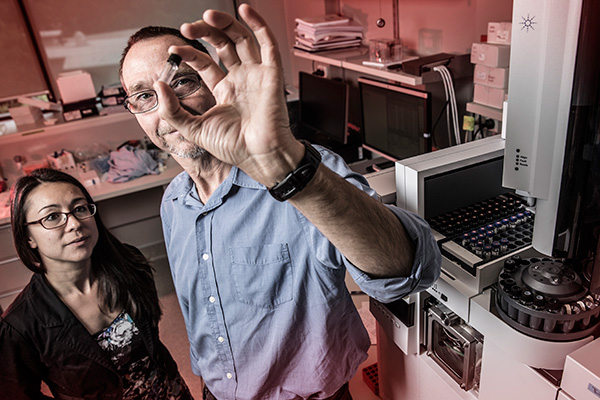November 20, 2014
Stem cell technology helps unlock mystery of Alzheimer’s gene
Neuroscientists investigate the main gene responsible for late-onset Alzheimer’s Disease.

Professor Brett Garner (right) and Dr Lezanne Ooi are investigating the main gene responsible for late-onset Alzheimer’s.
A study to determine how and why the main gene responsible for late-onset Alzheimer’s Disease regulates neuron survival is underway at UOW.
The study, led by Neuroscientist Professor Brett Garner, will investigate the disease affecting 10 per cent of people over the age of 65, and 30 per cent of people over the age of 85 in Australia.
Professor Garner, Acting Executive Director at the (IHMRI) based at UOW, said while Alzheimer’s was first described in 1906, our understanding of this terrible disease is still in its infancy.
“Alzheimer’s is the leading cause of dementia and there is no curative treatment for this devastating disorder, which by 2050 is expected to affect more than 900,000 Australians.”
Professor Garner and his team are poised to isolate and characterise the enzyme that splits the protein ‘apoE’, which is encoded by the main risk gene for late-onset Alzheimer’s, into tiny fragments within the brain.
“Understanding how this gene controls Alzheimer’s risk will resolve a major unsolved question in the field and could reveal a new therapeutic avenue,” Professor Garner said.
The characterisation of apoE has previously been too difficult due to the complexity of brain tissue. However, as a result of a new collaboration with neuroscientist and stem cell expert Dr Lezanne Ooi, also based at IHMRI, the researchers have discovered a new way to model the enzyme split in the dish.
“We are using skin cells that have been donated by Alzheimer’s patients to unravel the mystery of why apoE is such an important risk factor in Alzheimer’s disease, “ Dr Ooi said.
“By converting the cells into pluripotent stem cells and neurons in a dish, we are able to study fundamental differences in the proteins made by cells from Alzheimer’s patients.”
Professor Garner and his team hypothesise that apoE protein fragments may play a neuroprotective role in the brain.
“We think apoE fragments bind to receptors on the surface of neurons, triggering pathways that promote survival,” Professor Garner said.
This research project is funded by a $416,000 grant as part of a national strategy to target dementia-related diseases.
Professor Garner is also concurrently working on another groundbreaking .
Media contact: Elise Pitt, Media & PR Officer, UOW, +61 2 4221 3079, +61 422 959 953, epitt@uow.edu.au.